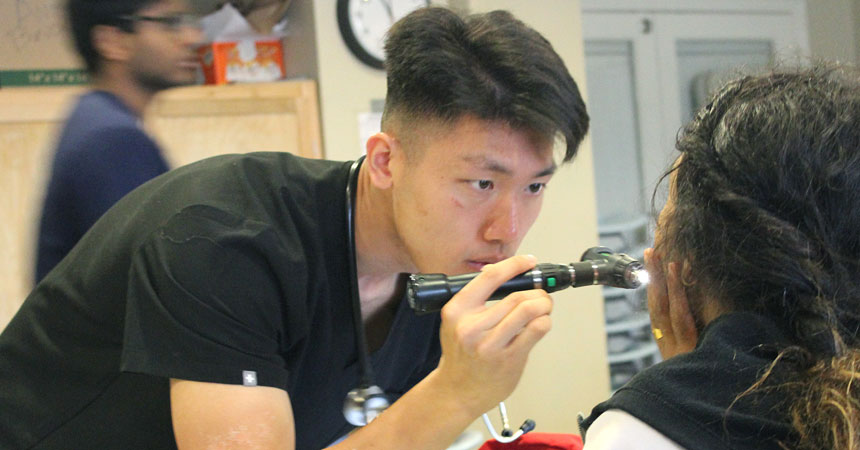‘Treating patients who are much different from you’
By Alex Branch

Exposure to medically underserved populations is an important part of the education of medical students at UNT Health Science Center.
And populations don’t get much more underserved than residents of two apartment complexes where newly arrived refugees settle in Fort Worth.
That’s where Texas College of Osteopathic Medicine (TCOM) students volunteer to conduct health screenings on mostly women and children from countries such as Iraq, Afghanistan, Sudan and Congo.
The idea of seeing health care providers for exams when they feel healthy confuses many refugees. Some have received very little health care during the lives or are overwhelmed by the prospect of accessing health care in the United States.
“It’s an incredible experience treating patients who are much different from you,” said Jonathan Hughes, a 2nd-year medical student and member of the TCOM Refugee Health Initiative. “We had one patient who didn’t understand that she had internal organs. We had to communicate what those organs are and why they are important through an interpreter.”
The Refugee Health Initiative, a student organization with about 85 student members, coordinates its volunteer project with UNTHSC physicians and resident doctors at John Peter Smith Hospital. Tarrant County is among the top three Texas counties where refugees are resettled.
The students have helped physicians provide health checks for more than 80 refugees since October. At each clinic, the students and physicians arrive at the apartment complexes with clinical tools, including a portable ultrasound machine and computer to access refugees’ electronic medical records if they have already been treated at JPS.
Diabetes and hypertension are two common diagnoses, said Dallas Miller, a 2nd-year student and Refugee Health Initiative member. One woman was found to have a large mass growing in her bladder.
Students help refugees who need further medical care make appointments at JPS through the JPS Connection Program, which provides assistant to people without health insurance.
The refugees have diverse backgrounds. Medical student Christine Lin provided care to a woman who was a queen in her native Congo. She now lives in apartments with about 40 members of her African tribe, who still recognize her and her husband as royalty.
Other refugees share stories of unfathomable pain.
“We talked to a woman who saw her husband and brother executed in front of her,” Miller said. “They have been through things that we can’t imagine. As students, it’s a great learning experience and opportunity to help make their lives a little better.”






Social media